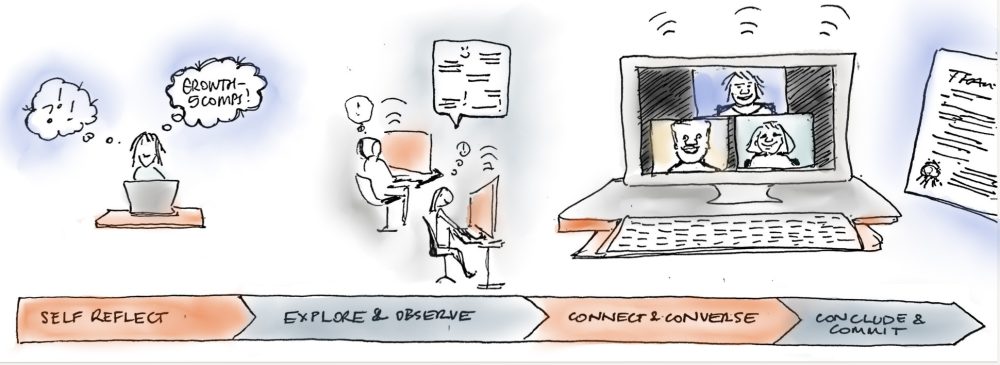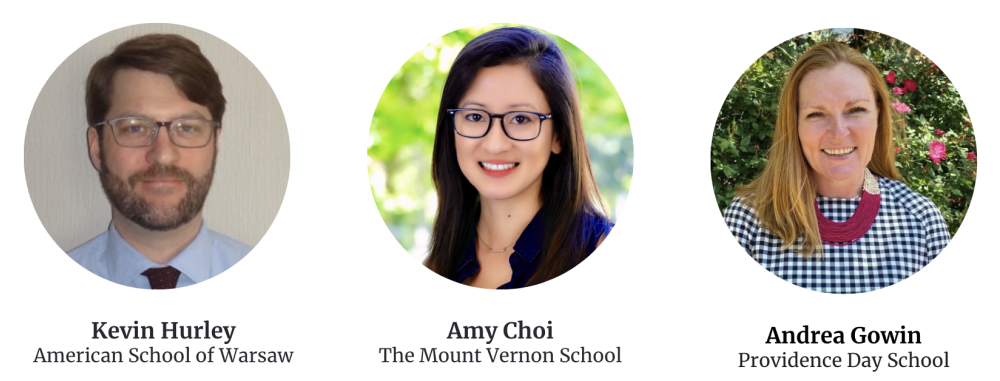Supporting Teacher Growth: How GOA Approaches Teacher Development
GOA’s Growth and Evaluation process is grounded in reflection and relationships. In the first two years and then every third year after that, GOA faculty engage in conversations about their course facilitation experiences using GOA’s educator competencies as a lens. This process helps us align and calibrate practices across GOA programs, and is intended to celebrate and empower teachers. The goal is to continue to collectively deepen our understanding of these competencies and the practices that lead to high-quality online learning through self-reflection and collegial conversations between GOA faculty, their Learning Design Coach, and GOA staff members.
Where Course Design and Course Facilitation Meet
In the student program, we distinguish between course design and course facilitation as a way to think about and reflect on what high-quality learning looks like. Course design at GOA is a collaborative and focused process. Courses undergo formal review and redesign that is a partnership between a course teacher, a coach, and an instructional designer from GOA’s Design Lab. Course design sets the stage upon which GOA faculty are empowered to facilitate thoughtfully and creatively on a day-to-day basis–and where they have the most agency to impact students directly.
Supporting Faculty to Reflect on Course Facilitation
We believe that relationships are at the heart of learning–whether that is student learning or adult learning. GOA’s Faculty Growth and Evaluation process brings people together to talk about and reflect on what’s working, what may not be, and to share ideas.

The process starts with a faculty member using the educator competencies to guide their self-reflection, which they share with their Learning Design Coach (LDC) and a GOA staff member. The LDC and GOA staff member then spend time exploring and reflecting. This includes reading the teacher’s self-assessment, visiting the teacher’s Canvas course, and exploring what students say about their course experience in student survey data. The LDC and GOA staff member plan some coaching questions that (hopefully) will provide some context for a growth conversation which happens over Zoom. After the Zoom meeting, the LDC and the GOA staff member share a summary of what they learned through the conversation with the teacher. This includes areas to highlight and celebrate as well as strategies and suggestions for growth that were discussed during the conversation.

Learning Design Coach Perspectives
Kevin Hurley currently works at the American School of Warsaw. Kevin started with GOA in 2015 and has taught Comparative Politics, Advanced Economics, Macroeconomics, Microeconomics, Personal Finance, Intro to Investments and is soon to teach a new course—Blockchain & Crypto. “When I think about what these meetings are like, it goes quicker than you might anticipate because these are people you are coaching and you know them and their courses. So when you are going through each of these educator competencies there are probably things you know that can help these conversations be a little less formal. It really is a friendly conversation between the three of you.”
Amy Choi works at The Mount Vernon School. Amy started with GOA in 2020 and teaches International Relations. Amy explains her approach to preparing for a Growth & Evaluation meeting: “I think of specific questions that a colleague would be able to give some concrete evidence based on memories of courses and student interaction.” These conversations not only help deepen relationships between coach and teammates but as Amy explained, “They help me think about how I could support that teacher.”
Example coaching questions used to plan growth & evaluation conversations:
Cultivating Belonging | What are some signs you look for that you might need to ‘help’ or create more flexibility for a student? What examples spring to mind that went well or maybe not so well that we can talk about…? |
Foster Student-Led Learning | As you think about students leading or driving learning in your class, what are 1-2 examples that you can recall that really stood out? What does student-led learning look like in your classes and how might you like to see that change over time? |
Build Collaborative Communities | What are some ways that you help students move beyond the surface level talk when working collaboratively to get to deeper conversations about their work? |
Assess for Learning | What evidence of learning do you look for to know that your students have learned something key in your course? Which competencies do you find the hardest/easiest to evaluate? |
Redefining Time and Space | What are some ways you help students who live in different time zones connect and collaborate? How do you help your students to have ownership in when and where they take their learning? |
Faculty Perspective
Andrea Gowin works at Providence Day School. She started teaching Introduction to Legal Thinking for GOA in 2020. Andrea shares how focusing on the educator competencies through the Growth and Evaluation process has supported her teaching practice:
“The evaluation process for teachers at GOA is a reflective feedback process for individuals to review their approach to course content, student relationships, and evidence of learning. After my first full year of teaching at GOA, I was able to view data from student surveys and analyze growth to determine areas of improvement and weakness. This process assisted me in this year's courses. I immediately implemented ideas from my reflection, such as feedback through video and voice recordings to assist with building student relationships, providing positive tone and clear measurable improvement points for students. The evaluation also drove me to lean into my team and work to make sure our evaluations were consistent across sections by implementing ‘ghost grading of each other's students' work and comparing competency evaluations. Student relationships is an area I continuously believe can be improved through creative ways. Each week's loom video is posted to twist with a question attached. Something simple such as a student's favorite food or favorite song. I have now started to ask students to come up with weekly questions to involve them and allow them to be a part of the process. The time I spent on this reflection created new opportunities and improved my approach to starting the courses, routine feedback, and continuing to build student relationships.”
Conclusion
Individual and collective growth is a desired outcome of GOA’s Growth and Evaluation process. In his 2012 report Linking effective professional learning with effective teaching practice, educational researcher Peter Cole argued that “The purpose of professional learning is to produce more effective practice for both the individual and the school and thereby improve all students’ learning”. GOA is intentionally aligning our professional learning offerings with the Growth and Evaluation process. So far, the five educator competencies are serving GOA faculty, coaches, and staff as a thoughtful lens to identify and share effective practices as well as to celebrate and support individual growth.
Related articles
